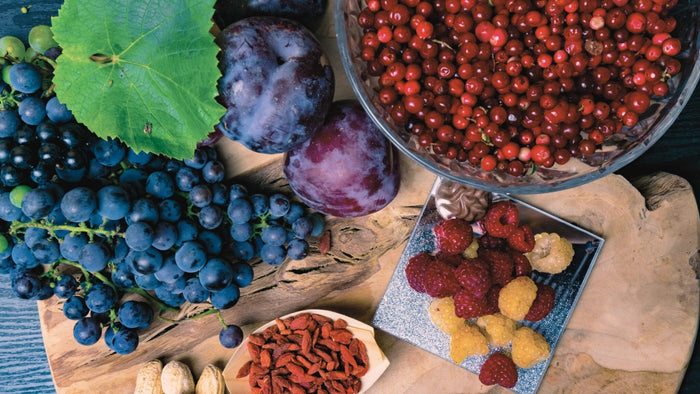In this article
If you’ve ever tried to convince yourself that a glass of red wine is a healthy decision…there’s actually some truth to that.
Red wine has a high concentration of resveratrol, a plant compound known for its antioxidant properties that’s found in more than 70 plant species including grapes, berries and peanuts. Resveratrol’s strong antioxidant properties can be attributed to its role as a polyphenol, micronutrients that help protect the body against pathogens like bacteria and fungi, as well as free radicals.2 In fact, polyphenols are touted as “lifespan essentials” for their potential to reduce the risk of chronic diseases; those who have polyphenol-rich diets (650 milligrams per day) have been proven to have lower death risks than those who get less than 500 milligrams per day.
What are the benefits of Resveratrol?
Needless to say, resveratrol is a powerful compound when it comes to health and wellness. Key benefits include:
- Blood clot prevention: Resveratrol has been proven to inhibit blood platelet aggregation, a process that leads to blood clotting. This process makes it more difficult for clots to form that can lead to fatal health issues like stroke and heart attack.
- Lower cholesterol: The antioxidant properties of resveratrol decrease the oxidation of “bad” (LDL) cholesterol, which leads to build-up in arteries. This helps reduce and prevent plaque build-up, which lowers cholesterol levels and prevents heart attack and stroke as a result of artery blockage.
- Improved circulation: Resveratrol can be a great antidote for poor circulation. It promotes vasodilation, the widening of blood vessels that occurs when muscles in arteries or large veins relax. This allows for an increase in blood flow that enables better circulation throughout the body, particularly important for optimal brain function.
- Anti-aging properties: Resveratrol acts as a natural anti-aging supplement by stimulating the production of SIRT1, a compound that prevents disease and boosts metabolism by speeding up mitochondria (energy production centers within cells). A slower metabolism and higher risk of disease are major factors of aging, so inhibiting these processes helps to slow down the aging process.
- Cancer-fighting compounds: Resveratrol works to inhibit the formation of cancer cells during all carcinogenesis stages – initiation, promotion and progression, helping to prevent the growth of cancer cells and tumors.
How can you increase your intake of Resveratrol?
You can increase consumption of resveratrol by eating more foods containing the powerful antioxidant – and, yes, by drinking red wine. You can also find resveratrol in supplement form, which allows for higher concentrations of the compound than the amount you can get through food consumption. However, the best way to reap the benefits of resveratrol is through daily supplementation in conjunction with other key nutrients to optimize your health and wellness.
MEND Regenerate makes this simple, as it’s the only product of its kind that contains resveratrol and more than 30 additional nutrients that work in tandem to fuel your strength, energy, vitality and immunity. Alongside resveratrol, key ingredients include: Vitamins C and D to support bone health; vitamins A, C and E and green tea extract to boost immunity; protein and amino acids designed to promote muscle growth and strength; creatine and vitamin B complex to enhance energy and endurance; as well as COQ10, an antioxidant that protects cells from damage and plays an important role in metabolic processes. MEND Regenerate is the all-in-one, daily nutrition solution to help you increase your intake of resveratrol and fuel your body with all the key nutrients it needs to support your everyday health and wellness.
LEARN MORE ABOUT MEND REGENERATESources
[1] 7 Health Benefits of Resveratrol Supplements. (Link)
[2] Salehi, B., et al. (2018). Resveratrol: A Double-Edged Sword in Health Benefits. Biomedicines, 6(3), 91. doi: 10.3390/biomedicines6030091
[3] Healthy Foods High in Polyphenols. (link)
[4] Pace-Asciak, C. R., Hahn, S., Diamandis, E. P., Soleas Goldberg, D. M. (1995). The red wine phenolics trans-resveratrol and quercetin block human platelet aggregation and eicosanoid synthesis: Implications for protection against coronary heart disease. Clin Chim Acta., 235(2), 207-219. doi: 10.1016/0009-8981(95)06045-1
[5] Resveratrol Supplements. (link)
[6] Witztum, J. L., Steinberg, D. (1991). Role of oxidized low density lipoprotein in atherogenesis. J Clin Invest, 88(6), 1785-1792. doi: 10.1172/JCI115499. PMID: 1752940; PMCID: PMC295745
[7] Is Vasodilation Good? (link)
[8] Wong, R. H. X., et al. (2011). Acute resveratrol supplementation improves flow-mediated dilatation in overweight/obese individuals with mildly elevated blood pressure. Nutr. Metab. Cardiovasc. Dis. 21, 851–856.
[9] Hubbard, B. P., et al. (2013). Evidence for a common mechanism of SIRT1 regulation by allosteric activators. Science, 339(6124), 1216-1219. doi: : 10.1126/science.1231097
[10] Hall, J. A., Dominy, J. E., Lee, Y. Puigserver, P. (2013). The sirtuin family’s role in aging and age-associated pathologies. J. Clin. Invest. 123, 973–979.
[11] Top Foods with Polyphenols. (link)



